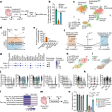Kidney failure, the decrease of kidney function below a threshold necessary to support life, is a major cause of morbidity and mortality. We performed a genome-wide association study (GWAS) of 406,504 individuals in the UK Biobank, identifying 430 loci affecting kidney function in middle-aged adults. To investigate the cell types affected by these loci, we integrated the GWAS with human kidney candidate cis-regulatory elements (cCREs) identified using single-cell assay for transposase-accessible chromatin sequencing (scATAC–seq). Overall, 56% of kidney function heritability localized to kidney tubule epithelial cCREs and an additional 7% to kidney podocyte cCREs. Thus, most heritable differences in adult kidney function are a result of altered gene expression in these two cell types. Using enhancer assays, allele-specific scATAC–seq and machine learning, we found that many kidney function variants alter tubule epithelial cCRE chromatin accessibility and function. Using CRISPRi, we determined which genes some of these cCREs regulate, implicating NDRG1, CCNB1 and STC1in human kidney function.
Variants in tubule epithelial regulatory elements mediate most heritable differences in human kidney function
Submitted by mlarkin on Sep 10, 2024



